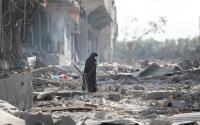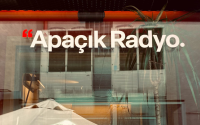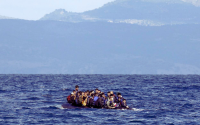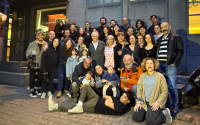16 April 2002Znet / Haaretz
Palestinian Authority Chairman Yasser Arafat is a super-ruler, in the eyes of the Israelis. He has been imprisoned in his office for over two weeks. All the buildings of his government, including prisons and security apparatus, are destroyed, vandalized, empty of people. All his men are scattered and in hiding. His telephone connections are dependent on the mercies of the Israel Defense Forces and its scrambling equipment. The supply of running water in his office has been cut off, and neither his status, nor his age, nor the large number of people with him, are a sufficient reason to have the damage repaired, i.e. the damage caused by IDF tanks and bulldozers to the water system in the area of his compound. Nevertheless, he is still responsible for the two lethal terrorist attacks recently carried out -- one by an opposition Islamic group, and the other by the Al Aqsa Martyrs Brigades, which is linked to Fatah. In other words, had he so desired, he could have prevented them, in Israel's opinion. Such a view of the Palestinian ruler could not have taken root in this way, were it not for the attitude of contempt toward the Palestinians, were it not for the working assumption that they are a herd which is only in need of a shepherd's crook. This profound contempt was regularly expressed by military spokesmen during the past week, who intimated that it was the Palestinians who didn't want to evacuate the corpses of their dead (and to offer aid to their wounded) from the Jenin refugee camp -- for foreign propaganda purposes. Such a statement is based on two assumptions about the Palestinian public: that Palestinian medical personnel, doctors, nurses and ambulance crews, make light of their oath and of their obligation to save lives; that they don't care about their own people (since, after all, many of them have relatives and friends in the Jenin camp, and in every other place in the West Bank where medical assistance did not arrive in time). Palestinian medical teams, according to the announcements of the IDF, do not have to fear social and family criticism for not doing their jobs, and do not have to take this criticism and their own feelings into account. They were, after all, guided by far-reaching "propaganda considerations," for the day after the war. The Palestinians, according to the IDF, also disdain the Muslim custom of burying the dead immediately. The Red Cross, UNRWA (UN Relief and Works Agency for Palestine Refugees in the Near East], the representatives of UNSCOT [Office of the UN Special Coordinator in the Occupied Territories], the representative of the World Bank, have substantial proof of their repeated efforts to allow them and Red Crescent ambulances to enter the camp (or the Old City in Nablus, or Arafat's compound). But on the ground, even after high-level coordination, shooting from an IDF position or tank prevented the ambulance from approaching, or the detention of the ambulance crew and their release several hours later frustrated the mission of immediate rescue. Last week, Israel spoke about moral and humanitarian steps taken in the war in the Jenin refugee camp, in order not to harm civilians. The proof: Soldiers who fell in Jenin would not have fallen had the IDF dropped one or two bombs on the camp, and ended the story. This statement contains within it another assumption about the Palestinians: They aren't killed by ordinary missiles launched from helicopters, and ordinary tank shells, and ordinary shooting from submachine guns, and they aren't afraid of them. They are only killed by, and afraid of, bombs dropped from fighter planes, and the IDF didn't drop such bombs. About 13,000 people live in the camp, whose area is about one square kilometer; 42 percent of them are children, 4.5 percent are over the age of 65. Even if we assume that it wasn't 90 missiles that were shot at the camp every day for a week, but "only" 20, and even if we assume that it wasn't 10 tanks that fired and shelled simultaneously, but only two, isn't it reasonable to assume that civilians were killed, and not only "terrorists in pockets of resistance"? The IDF didn't film the results of the aerial shelling and the firing from tanks, and didn't allow them to be filmed. What the photographers from the foreign television stations managed to record -- the corpses (mainly in Nablus), the pain of the relatives of those killed, the many wounded, the citizens shot and killed at the entrances to their homes, the bullet-pocked ambulances - are in any case not broadcast and reported here, or are squeezed into a few seconds of air time. An all-powerful ruler, even in subhuman personal conditions under siege; with his shooting-resistant followers, and medical and rescue services that constantly betray their mission. That is the picture that military and political spokesmen were careful to impress on the Israeli public. In order to succeed in a military and political campaign, one has to know the enemy: his weaknesses and his strength, his defects and his capabilities, his pain and his happiness. Instead, the enemy is presented only as a one-dimensional mass, ignorant and lacking feelings and thoughts. Perhaps the lies being disseminated about the Palestinians during these days of war actually express the contempt of the Israeli authorities toward the Israeli public, and an implicit assumption that it will continue to swallow them. That it will always make do with intelligence analyses, and will avoid sociological, historical and political ones, and therefore will not ask why so many Palestinians want to blow themselves up and take others with them, and how hundreds of thousands of Palestinians are holding out in intolerable conditions of shelling and continuing curfew, without water, electricity and food?






